Potřebujeme váš souhlas k využití jednotlivých dat, aby se vám mimo jiné mohly ukazovat informace týkající se vašich zájmů. Souhlas udělíte kliknutím na tlačítko „OK“.
ASTM F1634-95(2008)
Standard Practice for In-Vitro Environmental Conditioning of Polymer Matrix Composite Materials and Implant Devices
Automaticky přeložený název:
Standardní praxe pro in-vitro environmentální Klimatizace polymerní matrice kompozitních materiálů a implantu
NORMA vydána dne 1.8.2008
Informace o normě:
Označení normy: ASTM F1634-95(2008)
Poznámka: NEPLATNÁ
Datum vydání normy: 1.8.2008
Kód zboží: NS-50973
Počet stran: 5
Přibližná hmotnost: 15 g (0.03 liber)
Země: Americká technická norma
Kategorie: Technické normy ASTM
Kategorie - podobné normy:
Anotace textu normy ASTM F1634-95(2008) :
Keywords:
accelerated conditioning, composite, diffusion, environmental conditioning, fiber, implant devices, moisture absorption, polymer, Accelerated aging/testing--plastics, Accelerated aging/testing--surgical devices/applications, Composites--surgical implants, Environmental conditioning, Fiber analysis, Moisture analysis--medical/surgical devices/applications, Polymers (surgical applications), Surgical implants, Testing methods--surgical implants, in vitro Evaluation
Doplňující informace
| Significance and Use | ||||||||
|
The conditioning procedures covered in this practice provide methods for saturating PMC specimens in a liquid environment prior to conducting other tests for property evaluation. The conditioning may affect geometric and dimensional changes in specimens. In some severe cases, chemical changes may occur in the fiber, polymer and fiber-polymer interphase and interface. Caution must be taken if Procedure B (10.2, Procedure B—Accelerated Moisture Saturation at Elevated Temperature) is followed to condition PMC specimens at an elevated temperature. Physical and chemical reactions in materials are normally temperature dependent. An increase in experimental temperature may accelerate a desirable moisture diffusion process. However, elevated temperatures above 37°C may also cause undesirable reactions that do not represent appropriate responses of materials at 37°C. Consequently, a pilot study is recommended in Procedure B to determine if a selected elevated temperature can be used for accelerated conditioning. If the properties of materials are determined to be irreversibly affected by this pilot study at the selected elevated temperature, then either an appropriate lower elevated temperature should be determined by repeating the pilot study, or Procedure B should not be used. |
||||||||
| 1. Scope | ||||||||
|
1.1 This practice covers two procedures for conditioning non-absorbable polymer matrix composite (PMC) materials and implant devices in a liquid environment to obtain a state of saturation. 1.2 The purpose of this practice is to standardize methods and reporting procedures for conditioning PMC materials and implant devices (PMC specimens) in a user selected liquid environment prior to conducting subsequent tests. It is not the purpose of this practice to determine the diffusion coefficients or actual saturation levels of a given liquid into the materials and devices. For these determinations, other procedures, such as Test Method D 5229, may be followed. 1.3 Diffusion of liquid into a solid material is a slow process. While the time necessary to achieve saturation at 37°C may be sufficiently short for thin specimens, such as fracture fixation plates, it may be prohibitively long in thick sections, such as femoral components for hip arthroplasty. However, the diffusion process may be accelerated at an elevated temperature. Consequently, two separate procedures (Procedures A and B) are presented in this practice. Procedure A covers exposing the specimen to the desired conditioning environment at 37°C. Procedure B prescribes a method to accelerate the diffusion process by conditioning the specimen at a selected elevated temperature. 1.4 This practice does not specify the test environment to be used for conditioning. However, the pH value of immersion liquid shall be maintained at 7.4 ± 0.2 to simulate the in vivo environment. 1.5 The values stated in SI units are to be regarded as standard. No other units of measurement are included in this standard. 1.6 This standard does not purport to address all of the safety concerns, if any, associated with its use. It is the responsibility of the user of this standard to establish appropriate safety and health practices and determine the applicability of regulatory limitations prior to use. |
||||||||
| 2. Referenced Documents | ||||||||
|
Podobné normy:
Historická
1.12.2012
Historická
15.1.2012
Historická
15.8.2013
Historická
1.4.2014
Historická
1.6.2013
Historická
1.12.2013
Doporučujeme:
Aktualizace technických norem
Chcete mít jistotu, že používáte pouze platné technické normy?
Nabízíme Vám řešení, které Vám zajistí měsíční přehled o aktuálnosti norem, které používáte.
Chcete vědět více informací? Podívejte se na tuto stránku.


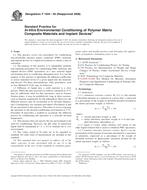
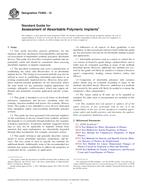 ASTM F2902-12
ASTM F2902-12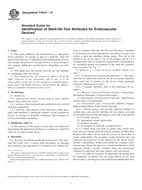 ASTM F2914-12
ASTM F2914-12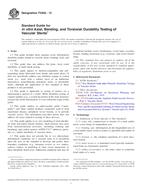 ASTM F2942-13
ASTM F2942-13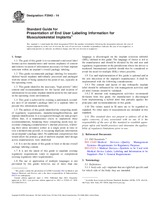 ASTM F2943-14
ASTM F2943-14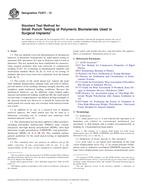 ASTM F2977-13
ASTM F2977-13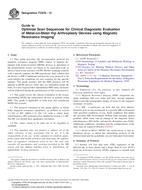 ASTM F2978-13
ASTM F2978-13
 Cookies
Cookies
